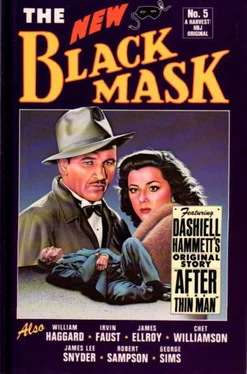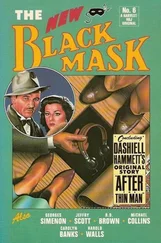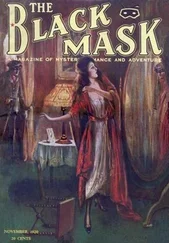William Haggard - The New Black Mask (No 5)
Здесь есть возможность читать онлайн «William Haggard - The New Black Mask (No 5)» весь текст электронной книги совершенно бесплатно (целиком полную версию без сокращений). В некоторых случаях можно слушать аудио, скачать через торрент в формате fb2 и присутствует краткое содержание. Год выпуска: 1986, ISBN: 1986, Издательство: A Harvest/HJB book Harcourt Brace Jovanovich, Жанр: Детектив, на английском языке. Описание произведения, (предисловие) а так же отзывы посетителей доступны на портале библиотеки ЛибКат.
- Название:The New Black Mask (No 5)
- Автор:
- Издательство:A Harvest/HJB book Harcourt Brace Jovanovich
- Жанр:
- Год:1986
- ISBN:9780156654845
- Рейтинг книги:4 / 5. Голосов: 1
-
Избранное:Добавить в избранное
- Отзывы:
-
Ваша оценка:
- 80
- 1
- 2
- 3
- 4
- 5
The New Black Mask (No 5): краткое содержание, описание и аннотация
Предлагаем к чтению аннотацию, описание, краткое содержание или предисловие (зависит от того, что написал сам автор книги «The New Black Mask (No 5)»). Если вы не нашли необходимую информацию о книге — напишите в комментариях, мы постараемся отыскать её.
The New Black Mask (No 5) — читать онлайн бесплатно полную книгу (весь текст) целиком
Ниже представлен текст книги, разбитый по страницам. Система сохранения места последней прочитанной страницы, позволяет с удобством читать онлайн бесплатно книгу «The New Black Mask (No 5)», без необходимости каждый раз заново искать на чём Вы остановились. Поставьте закладку, и сможете в любой момент перейти на страницу, на которой закончили чтение.
Интервал:
Закладка:
Daniel Patchin, a quiet, sometimes taciturn, man, is widely respected. He seems to live for his work and is busy throughout a long day for five-and-a-half days each week. Wednesday is early closing, and that afternoon he devotes either to fishing or shooting according to the season. When he returned from the Korean war, Daniel Patchin came to an amicable unwritten agreement with Lord Benningworth that on Sundays he would act as an unpaid forester for the estate, keeping Benningworth’s copses and woodland in good order, felling all diseased trees and clearing undergrowth, in return for which service he was allowed to keep all the timber he wanted. Every Sunday is devoted to this occupation, and Patchin has a woodyard at the back of his cottage where villagers can purchase logs and firewood.
The Patchin family has lived in Pasterne for centuries, but the Benningworth connection with the locality is even more ancient: Lord Benningworth can trace his ancestry back in this country to a Baron Will de Benningworth in 1220, and there are stone effigies of another Benningworth knight and his Lady installed in the church in 1290. The churchyard also houses many Patchin graves, but the earliest is dated 1695 with the epitaph:
Good people all as you
Pas by looke round
See how Corpes’ do lye
For as you are some time Ware We
and as we are so must you be
Occasionally in an evening Daniel Patchin may stroll round the churchyard eyeing the graves, particularly those of his own family. He likes those epitaphs which hint of un-Christian attitudes, for he has a cynical, mordant sense of humour; he is not a churchgoer. During his army service in Korea he found out that human life there was as cheap as that of turkeys at Christmas, and he adopted a stoic’s attitude to life and death. Serving as an infantryman he was awarded the Military Medal for his bravery in hand-to-hand fighting and won the nickname “pig-sticker” from his comrades for his skill with the bayonet.
Daniel Patchin leads a very quiet life, devoted to work and country pursuits, including gardening in the evenings. Lord Benningworth will sometimes stroll to the edge of his copse with a friend to point out Patchin’s garden with its fine rose beds and lines of potatoes, peas, and beans as straight as guardsmen on parade. Patchin’s wife Angela is ten years younger than him and before the marriage was known as a pretty, jolly, and slightly flighty girl in Skirmett, where she was brought up in a large farming family. The Patchins have no children, as Angela proved to be barren, and over the ten years of marriage she has taken on the Patchin family’s traits of seriousness and quiet outward mildness. She is a natural blonde with very fair, clear skin who blushes easily: any compliment from Benningworth’s son and heir before he left to work in America would always make her change colour. She works behind the till in a cubiclelike office in the shop on Patchin’s busiest days, always on Friday and Saturday, and occasionally on Thursday. Patchin employs a boy who makes himself generally useful on Friday evenings and Saturday mornings; otherwise he does all the work himself. He is a stocky man with massive muscles, enormously strong. Behind the shop there is a large shed which was used for all the slaughtering for the business up till about twenty years ago, and that is where Patchin dispatches local poultry and scores of turkeys and geese at Christmas.
It was on a glorious late May afternoon that Daniel Patchin first became suspicious of his wife. It was a Monday, and at lunch she had said that she would go for a walk in the afternoon. Returning at five, she looked in at the shop to ask if he would like a cup of tea. He nodded and asked if she had enjoyed the walk. She hesitated, and he looked up from the mincing machine to see that she had blushed and was nervously fiddling with the buttons on her blouse as if to make sure they were all fastened. It would be difficult to imagine a more observant man than Daniel Patchin: his whole life both at work and during his time away from the shop had sharpened his perceptions. He had made a lifetime study of his customers and of nature; it was his sole inactive hobby. The slightest change in a pensioner’s expression, even the movement of an eye, was enough to tell Patchin that he was proffering a too-expensive piece of meat; the faintest ripple at the end of a roach “swim” caught his notice, as did the sound of a twig snapping. When she did not reply about the obvious pleasures of a country walk on a perfect May afternoon, Patchin covered his wife’s loss for words with a quick comment about an old woman who always called in for broth bones on a Monday.
When Angela left the shop, Patchin gave her back an intense look, noting that she had changed completely from the clothes she had worn at lunch. When she returned with the tray of tea, she had covered her pretty white blouse with an old brown cardigan. She was still nervous, restless, very slightly ill at ease. Patchin knew that she was a hopeless liar but did not ask any more questions. There was a fresh smell of lemon soap, and Patchin knew she had washed her face, probably plunging it repeatedly into cold water to get rid of the faint, pink flush. Again he covered her silence with talk of how he might go down to the river that evening. The season for coarse fishing did not start till mid-June, but it was something he occasionally did out of season, inspecting favourite angling haunts to see how they had been affected by the high level of the Thames in winter.
During the next few weeks he added to his short list of pastimes the one of observing his wife: nothing that she did escaped him, even the merest hint of exasperation or frustration was filed away silently in his head — but nothing unusual ever attracted a comment from him.
It would not have required special ability as an observer to note Angela Patchin’s revived interest in her clothes; even on Monday mornings when she did her weekly wash and on Wednesdays when she usually cleaned Pound Cottage from top to bottom she stopped wearing her old navy skirt and blossomed out in a new green one worn with a pretty apron or jeans. She went to the Marks and Spencer store in Reading ostensibly to buy a summer frock but returned with several packages.
One Monday afternoon when Angela had gone for another walk, Patchin closed the shop for a quarter of an hour and thoroughly inspected her chest of drawers. He took meticulous care in moving and replacing the various things; he found several new items of underwear, including a particularly skimpy pair of knickers and a brassiere designed to thrust size thirty-six breasts up and outwards as if proffering them to some lusty lad in a Restoration play. But which lusty lad? That was the question that teased Daniel Patching brain, taking his attention away from his work so that he tended for the first time in his life to become a little absentminded and not quite the usual model of efficiency. It was immediately noted by the villagers — “Seems more human somehow” was the general verdict, though expressed in different ways.
For a while Patchin speculated as to whether Lord Benningworth’s son had returned to Pasterne and was again flattering Angela. If so, it seemed a more serious matter than before, now apparently extending to her amply filled blouse. But an inquiry, casually phrased, to the Benningworth’s housekeeper informed Patchin that the heir to the estate was still working happily in New York and did not plan to return home before Christmas.
Patchin’s reaction to Angela's unusual behaviour varied considerably. At times he became quite fascinated by his secret observation in a detached way, as he had once studied an elusive old pike in a pool near Hambleden Mill: for weeks throughout one autumn he had tried various baits to entice the wily monster until he realised that the pike could be stirred into action only by a fish with fresh blood on it; so Patchin had served up a dace, liberally doused in blood, and the pike had succumbed. At other times Patchin experienced a feeling of cold fury that someone was stealing his wife from him; he was quite certain that it was happening. Once he woke with a horrid start in the middle of the night, convinced that the telephone had rung just once, and then lay awake consumed with feelings of jealousy and twisted lust; he did not fall asleep till just before the alarm bell rang at six.
Читать дальшеИнтервал:
Закладка:
Похожие книги на «The New Black Mask (No 5)»
Представляем Вашему вниманию похожие книги на «The New Black Mask (No 5)» списком для выбора. Мы отобрали схожую по названию и смыслу литературу в надежде предоставить читателям больше вариантов отыскать новые, интересные, ещё непрочитанные произведения.
Обсуждение, отзывы о книге «The New Black Mask (No 5)» и просто собственные мнения читателей. Оставьте ваши комментарии, напишите, что Вы думаете о произведении, его смысле или главных героях. Укажите что конкретно понравилось, а что нет, и почему Вы так считаете.












